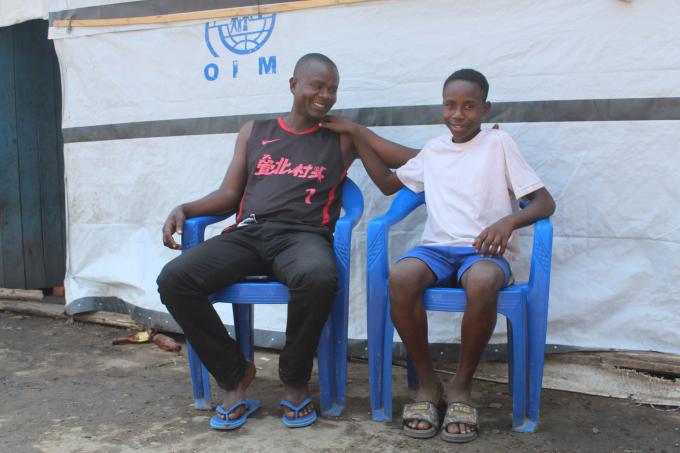Climate Change: Owen's Story
OWEN, 16, BURUNDI
•Additional person – Joachim, 42 years old, Male, father.
Floods are a recurrent problem in the east African country of Burundi. The country’s topography and the absence of proper roads and drainage infrastructure means residents of the city of Bujumbura have to flee their homes almost every rainy season. In April 2020, entire villages in the west of the city of Bujumbura were overwhelmed by water, after days of torrential rains causing rivers and lakes to burst their banks. Owen, 16, and his family lived in a commune close to Bujumbura city when their house got flooded, destroying most of their possessions including school materials. Owen was with his father, Joachim, 42, and Owen’s step mother and 4 siblings at the time. Like other families in the area they were forced to relocate to a displacement camp. Owen was not able to enrol at the local primary schools as places were limited. As a result, he was obliged to cover long distances every morning to go to his school back near Bujumbura city. In June 2020, just before his final exams, the water levels had slightly decreased and his father made the decision to return to their commune so that Owen could be nearer to his school to make it easier for him with his final exams.
However, days after their return, while they were sleeping, their house got flooded for the second time and washed away Owen’s school materials that he had received earlier in June. His school was also was flooded, ultimately causing Owen to drop out of school. Owen and his father were later moved back to the displacement site where Owen now lives with his grandmother. His father lives with his wife and 4 children. Life at the site has not been easy for Owen as sometimes he spends a day without eating. At his father’s house, he only eats with permission from his stepmother.
Save the Children in Burundi has responded to the immediate needs of populations affected floods in Bujumbura by distributing non-food-items to about 1,000 affected children in the displacement camps. At the beginning of the flood, our Burundi teams supported displaced children with school materials including copy books, pens and clothes. Owen was among those children that received school kits, although unfortunately, Owen lost all this in flood when he moved back home closer to his school. Save the Children’s response also included case management, Psychosocial support services, awareness raising on covid-19 prevention as well as prevention and response to Child protection and Gender-based violence in the camps.
Interviewee’s story in their own words (Quotes):
Owen:
“I dropped out of school last year due to the lack of school materials, because my copy books were damaged by the floods”
“I need school materials and food”
“I’ve been living here in the camp for 1 year and 3 months now”
“My family has been displaced twice because of the floods”
“The thing that I am most afraid of is sleeping with an empty stomach, because I know how hunger hurts. Like yesterday, I did not get something to eat.”
“When I grow up, I want to be a driver of heavy trucks as my father used to be and travel East African region”
Joachim:
“I am currently unemployed, but here in the site I do some small odd jobs nothing special. I used to be a a long-distance driver. I travelled a lot in Economic Community of the Great Lakes Countries.”
“Life in this camp site in very difficult. It is only by God’s Grace that I am still alive. Before, I had my own house and a house for my children. Now, I am having to share with other families in a collective tent.”
“It is very hard to get accustomed to such a life. When my house got flooded, I left most of our belongings behind including mattress, kitchen materials, furniture.”
‘With the COVID-19 things are even harder because, the border of DRC had been closed so we can’t leave to go and find better life elsewhere”
“The camp management has given us permission to cultivate vegetables around the camp but the soil here is not fertile and it requires extra effort to grow anything.”
“In terms of providing food for my children, it depends on what I have made that day. Most of the time, they have one meal, around 3 pm so that they can spend the night.”
“I am still worried about the flooding. The level of water in our commune has not yet decreased. I am afraid of the coming rainy season, surely it will damage even this site because when it rains, the ground here becomes muddy. Water also enters in our tents.”
“If only I could get some support. I want my children to return to school, learn and become important people in our community. There, they will help me also when I will be very old.”
Background / Project information
Burundi is among 20 countries in the world most susceptible to climate change, and most of its humanitarian needs are caused by recurring climate-related disasters. United Nations Office for the Coordination of Humanitarian Affairs (OCHA) in 2020 reported a total of 34 905 (majority of them children) were affected by the recent floods. Save the Children in Burundi in partnership with SOJPAE (a local NGO), revitalised the Child Protection committees as well as trained and coached community-based volunteer mobilisers. The community-based volunteers support our humanitarian work reaching the hardest to reach children.Despite the different interventions made by the government and partners, the families continue to live in vulnerable conditions with the need for Food and NFI still immense. This is why we’ve added the flooding response to our humanitarian response in the region.
 Rwanda
Rwanda 